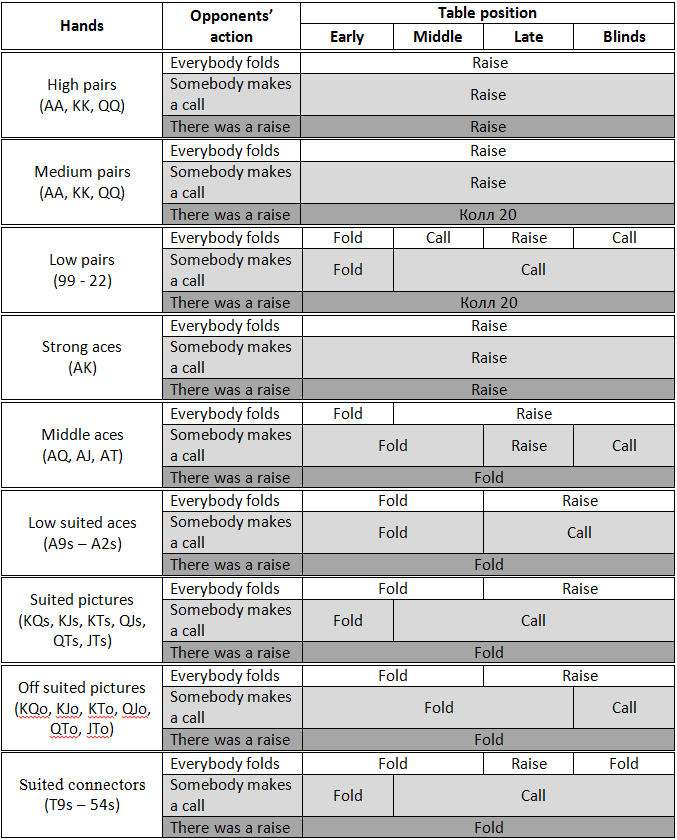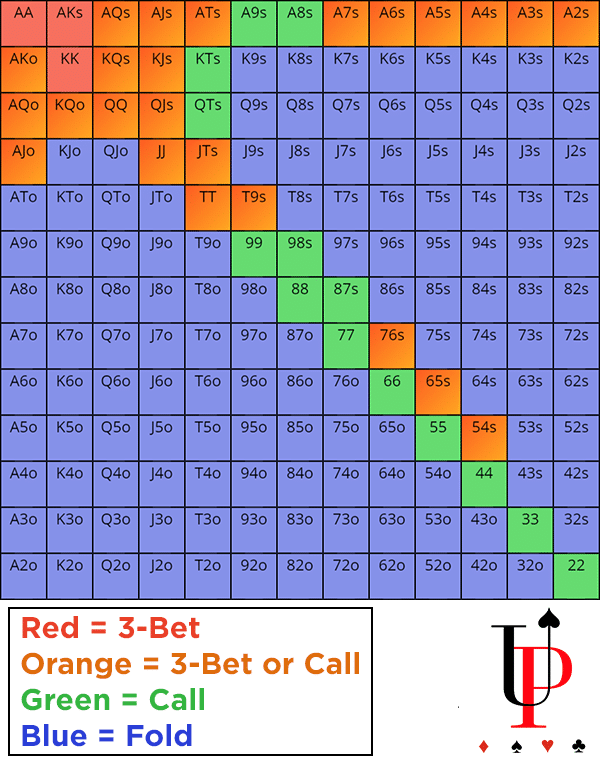As its name suggests, a loose-aggressive poker strategy sees players loosen up their starting hand requirements (they play quite a lot of hands, often 30% or more that are dealt to them) and they. Whether you are a beginner looking to research the basics of the game or a seasoned player looking for more advanced online poker strategy. Poker Starting Hands Chart!
Basic Starting Hands - Texas Hold'em
Poker Starting Hand Chart
“What hands you play in Hold'em is as much about your position at the table as it is the hands yourself.
Here's a useful downloadable chart explaining hand rankings and what starting hands you should play. Click to download.
9-9, for example, is a good raising hand in late position if no-one has raised the pot beforehand, but in early position (the small or big blind) you can find yourself in trouble if you're first to act after the flop.
The first thing to do is group starting hands together: Premium, Semi-Premium and Marginal.
Premium hands are things like A-A and K-K. With these hands you'll be raising and re-raising, in every position at the table.
Next, Semi-Premium hands are ones like A-K, Q-Q, J-J, 10-10 and K-Qs. With these you should raise in every position, and re-raise with them in late position only. A-K is OK to just call a raise with in early position, as if you're first to act you can comfortably check-call on a low flop, or bet out if you've hit top-pair. Remember, A-K is only 'ace-high', i.e. it has great value only if you make a pair with it.
Next, Marginal hands are a bigger group of cards. In this group you can put 9-9, J-10s, 10-9s, A-10s, A-Js, K-Js. Raise in late position only in an unraised pot and call in early position if you have value.
In real money online poker games, disciplined starting hand selection is a core skill which every successful player has mastered. You’ll start with a list of hands to play, then learn to adjust this based on several key in-game factors including position, raises ahead of you and the known tendencies of players who are still to act. You will also be able to use assumptions on starting hand strategy as the basis for reading your opponent’s hands – a skill which can boost your win-rates significantly.
This article starts with the basics, going through the different types of starting hands you might want to play. Next, you will see how your position at the table affects the range of playable starting hands. Situations where there is a raise ahead are covered after that, and then how to account for different kinds of players who act after you. At the end of this article you will find advice on how beginners can progress with different starting hands as they gain experience.
Types of Starting Hand and the Hands You Should Play & Avoid
Thinking about starting hands in groups can help keep your decisions easy while you are learning the game. I have divided starting hands into, pairs, high card hands, speculative hands and junk.
Pairs: We need to make a clear distinction between premium pairs (aces, kings and to a lesser extent queens) and the rest. Premiums are playable most of the time, while mid-pairs can be dangerous when there is action ahead – particularly if this comes from a tight opponent. As pairs get lower they become less playable from early positions and behave more like speculative hands – which need to improve to become valuable.
High Card Hands: Unpaired high cards include strong hands like Ace-King or Ace-Queen suited, right down to some dangerous hands like King-Ten. As the cards get lower, there is more danger of being ‘dominated’ by a high card hand with a higher side-card. Since people rarely play King-Eight or lower, hitting top-pair on the flop with King-Ten is more likely to get action from a hand which has you crushed than one you beat.

Speculative Hands: Aces with suited side cards and suited connectors (cards close in rank and the same suit) can flop big hands, or more often draws to flushes or straights – or even both. These are good hands when you do not have to pay too much to enter a pot. Since they miss most of the time, you need to have enough chips still in your stack to win a very big pot those times you hit a monster hand.
Junk: Pretty much everything not covered here is junk. If you are a new player then get used to ditching that Queen-Nine or Ace-Seven, especially when there has been a raise ahead. The times you hit a lucky 2 pair will not make up for all the times you hit your 2nd pair and have no idea whether you are ahead or behind on the flop.

Position and Starting Hands
When you are first to act at the table, you have no idea how many raises and re-raises there will be from players still to act. This means that speculative hands, the smallest pairs and the lower end of the high-card hands can‘t be played profitably. Save these hands for when you are closer to the button position and have seen most of your opponents act. Calling bets with suited connectors or small pairs can give you a hidden monster on the flop while you are last to act.

Playing from the blinds might mean you get to see a flop ‘cheap’, however you will be first to act after the flop. Calling just a couple of dollars to see a flop, hitting middle pair with a bad kicker and being out of position is not a great situation in poker. Get in the habit of folding those junk hands from the blinds; you will save yourself a lot of chips on later streets.
When Someone Else Has Already Bet
The biggest single adjustment you should make with your starting hand selection occurs when someone has already bet into the pot before you act. Here you have to tighten up your range, and think in terms of ‘should I re-raise, or should I fold?’ Some hands can be called with, for example small pairs or suited connectors. What you do not want to do is find yourself with a fairly strong hand after the flop and an opponent betting into you. Solve this problem early by folding the weaker part of your starting hand range when someone bets ahead of you.
Tendencies of Opponents Still To Act
Online Poker Strategy Tips
When the players acting after you have shown that they are the quiet, tight and passive types – then you have a lot of freedom to play speculative starting hands. Conversely, when you are faced with players who like to re-raise, or call and then lead out on the flop a lot, then you are more constrained in what you can do. This can be useful when you are faced with a marginal decision on whether to play or fold. Those aggressive opponents could tip you in favor of waiting for a better spot.
Bringing It All Together – Starting Hands for New Players
Poker Starting Hands Ranking
You need to have an elastic starting hand range in online poker games. Start with a list of the hands you would like to play, for example 55 or better, Ace-Jack+, King-Queen Suited and suited aces down to Ace-eight with the occasional suited connector. Next chop off the weakest of those hands for situations like early position, someone betting or wild opponents still to act. You can add a couple of more speculative hands at when you are on the button.
Online Poker Tournament Strategy
As you gain experience, you can start adding more hands to your list depending on each unique situation you encounter. New players tend to make more mistakes playing too many hands, I advise you to start tight – there will be plenty of opportunities to add hands on later.